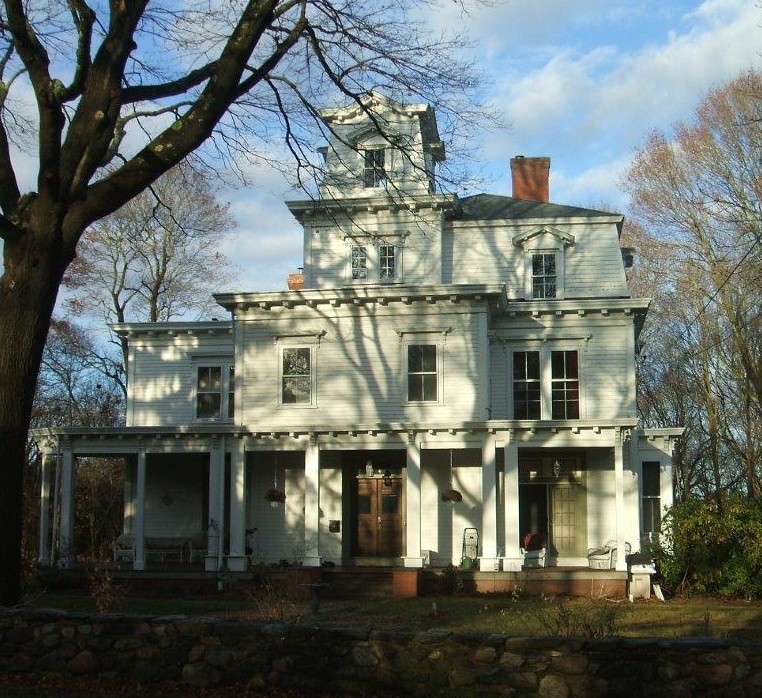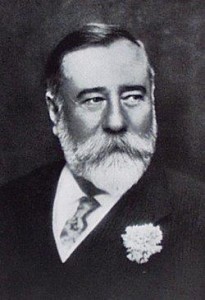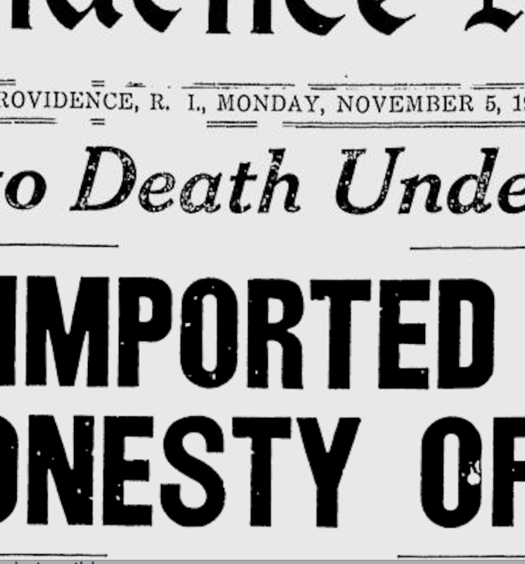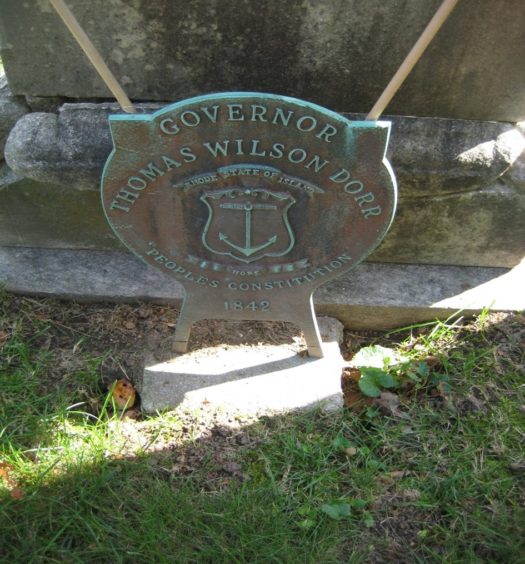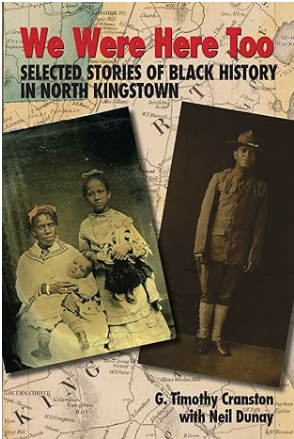Life, as anyone who has lived for a time can tell you, is fraught with irony. And sometimes, so it would appear, is death. A case in point is that of North Kingstown’s David Sherman Baker, who in 1893 was elected governor of the great state of Rhode Island. This story is quite appropriate for the political insanity we find ourselves immersed in now.
Many North Kingstowners with an interest in history believe that William Gregory is the only North Kingstowner ever elected governor of Rhode Island. The truth is that William Gregory is the only North Kingstowner ever to serve as governor. He was, however, the second citizen of North Kingstown to be elected governor; David Baker being the first. We’ll come back to old Bill Gregory; let’s now take a gander at the story behind Rhode Island’s only purloined election, the vote of 1893.
1893 marked a turning point of sorts in the political history of Little Rhody. It was the end of a time when there was some semblance of balance between the two political parties. And it was the beginning of the age of Marsden Perry and Nelson Aldrich, when these two power brokers, these two capitalists extraordinaire, began their assault upon the nation. It all began here in Rhode Island and David Sherman Baker was the first great casualty of this conflict. He was an honest man up against a power he did not fully comprehend. But Marsden Perry and Nelson Aldrich understood it all too well. Marsden Perry, the self-styled “Boss of Rhode Island” and his business partner, U.S. Senator Nelson Aldrich, whom the Washington journalists then dubbed “The General Manager of the United States,” were on their way to achieving their goal of total control of not only Rhode Island, but all of New England and the rest of the nation. A great part of their plan required that they have complete dominion over their power base of southern New England, and David Baker, a small-town lawyer and superintendent of the local school department, was standing in their way.
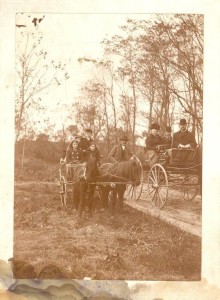
The family of David S. Baker, with the gubernatorial candidate to the far right (Baker Family Photo Collection)
David Baker was North Kingstown born and raised. His boyhood home was on the corner of Pleasant and Friend streets in Wickford. But by the time he had worked his way through the public school system of North Kingstown and then East Greenwich Academy followed by a degree from Brown University in 1875, he was known statewide as a fair, honest, and intelligent man of principle. He was also a success as a lawyer and was well connected by way of his marriage to Anita Candler, daughter of Judge and former U.S. Representative John Candler of Brookline, Massachusetts. Thus, he had his own base of wealth and power, although it was minor compared to that of Perry and Aldrich. Baker served in the Rhode Island House of Representatives from 1878 to 1880 and in the Rhode Island Senate from 1882 to 1885, after which he was appointed U.S. District Attorney for Rhode Island.
In 1893, this former superintendent of schools for North Kingstown, state representative from North Kingstown, and state senator from Providence (by then Baker had a home there while maintaining his summer estate on what is now Prospect Avenue in North Kingstown) was the Democratic candidate for governor, running against Perry’s handpicked man, the incumbent Governor D. Russell Brown. The campaign and election were fiercely contested and rife with political posturing and subterfuge. Perry and Aldrich must have felt that they had the election “in the bag.” But after the dust cleared, things had not worked out the way that the Boss of Rhode Island and the General Manager of the United States had figured. The final tally was this: Prohibition candidate Henry Metcalf—3265; Republican candidate D. Russell Brown—21,830; and Democratic candidate David Sherman Baker—22,015. Seemingly, Baker had done the impossible, the unthinkable. He had beaten the state’s and country’s most powerful movers and shakers at their own game. He was to serve as governor of Rhode Island! Or was he?
Not so fast, said the Republicans. The constitution of the State of Rhode Island requires a majority to win, not a plurality; so since Baker did not capture more than 50% of the popular vote, the election would be turned over to the Grand Assembly (combined state house and senate), which was supposed to examine the ballots and interpret the will of the people. This too became problematic as the Grand Assembly was deadlocked with exactly 54 votes for each major party. This being an age before the lieutenant governor was allowed to vote as a tiebreaker, things remained unsettled. The behind-the-scenes machinations and political subterfuge continued until it was known to both parties that a yet unnamed Republican was ready to do the unthinkable and switch his vote in favor of Baker. This would surely end the stalemate and North Kingstown’s son would become Rhode Island’s governor, this time for sure! Or would he?
Perry and Aldrich were not about to give up so easily. Before another vote could be taken, they had their man, Governor Brown, step in. Backed by the full power of his office (and the state militia) he invoked the parliamentary power of proroguery whereby he could order the deliberations of the Grand Assembly discontinued and made null and void without having to dissolve the Assembly, which had deliberated for four days without making a decision. This, he said, allowed him to remain governor until the next election. This pleased Perry and Aldrich immensely.
The Democrats were up in arms. They would take this decision to the Rhode Island Supreme Court which surely, would make Baker the rightful governor of Rhode Island! Or would they?
Sadly, the Democrats did not understand that the deal was made, the die was cast. The state Supreme Court in 1893 was already in the back pockets of Perry and Aldrich. The justices declared Brown’s action proper and in line with the state’s ancient constitution based upon English law. D. Russell Brown would remain governor.
Next year Baker and the Democrats tried again. But David Baker’s moment had passed; it had been wrenched out of his grasp never to return. The Republican machine would dominate Rhode Island politics for decades to come. Perry and Aldrich had their way. Baker was soundly defeated in 1894. His career in politics was at an end, though he later did hold appointments on the state Board of Education, the commission for revising the State Constitution, and the commission for building a new State House.
Where is the irony in all this, you might ask. In 1900 Perry and Aldrich handpicked a new governor. A more palatable candidate than Brown, William Gregory was a man of the people. To Perry, Gregory was the perfect choice. He won handily and became North Kingstown’s first seated governor, taking the title that had rightfully belonged to Baker. Gregory did not live long after that; he died in office of complications from kidney disease and was buried with great ceremony in Elm Grove Cemetery. Five years later David Baker, a man who, soured by the experience, never returned to public service, died from complications from diabetes. He was laid to rest right next to, you guessed it, William Gregory. And there they lie, side by side for the last 100 years. An “only in Rhode Island” tale if there ever was one!
[Banner image: A Second Empire mansion, circa 1888, at 67 Prospect Street on the The David S. Baker Estate, Cedar Springs Farm, on the southern edge of Wickford, which served as David S. Baker’s summer home for many years (Collection of Tim Cranston)]Bibliography
Town of North Kingstown Vital Records, Town Clerk’s Office
Records of the Cranston’s of Wickford Funeral Home – unpublished (author’s collection)
The Harriet Smith Diaries, transcribed by Rachel Peirce – unpublished
Hinckley, Anita Baker, Wickford Memories, Boston, 1972
Representative Men and Old Families of Rhode Island, J.H. Beers, 1908
The Wickford Standard Times, 1893 Election coverage, various editions
The Providence Journal, 1893 Election coverage, various editions

